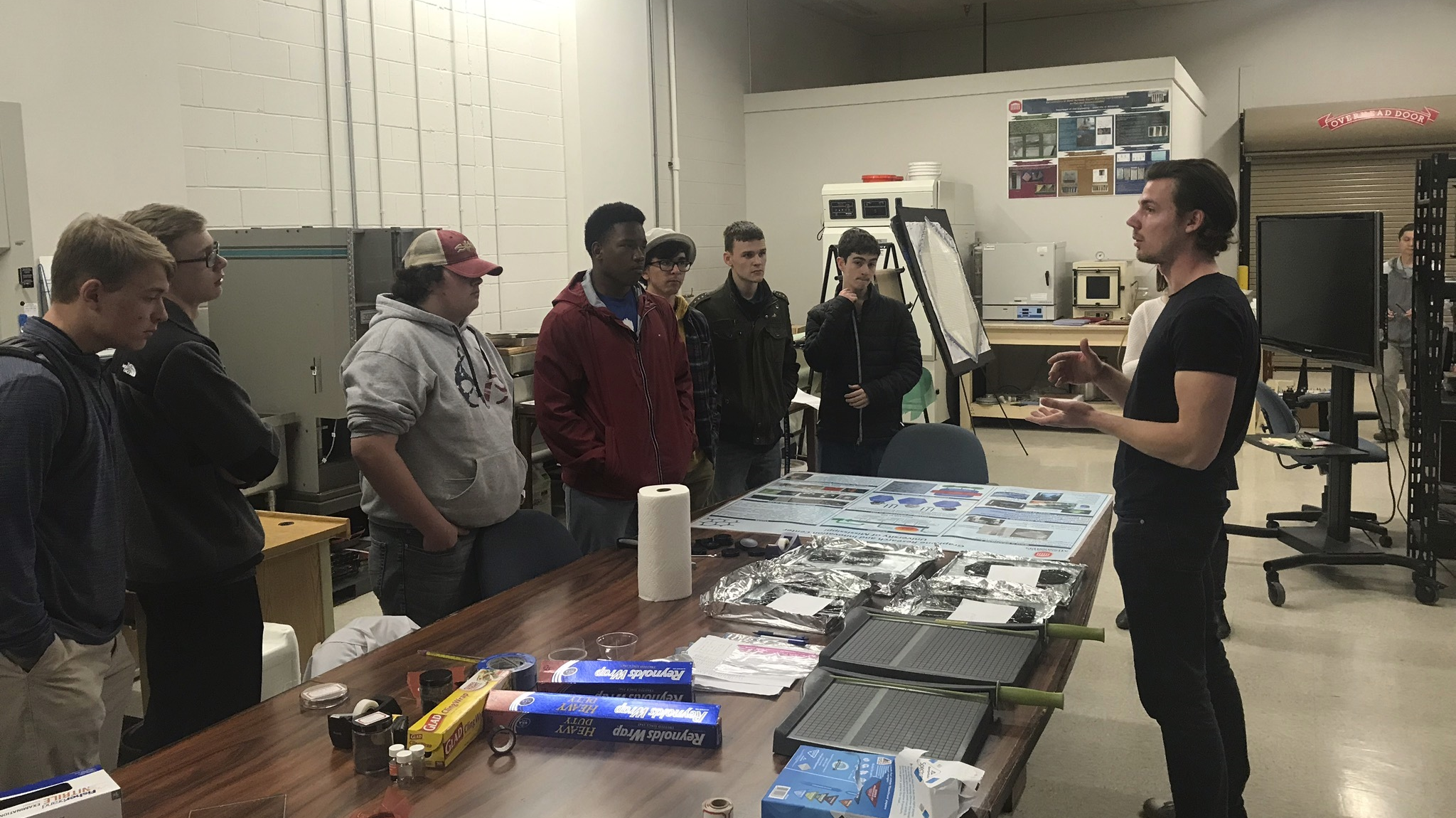
Civil engineering graduate student Torkel Nord Bjaerneman talks about graphene with Madison Central High School seniors Aiden Duncan (left), Sam Gaines, Travis Frazier, Jai Sanders, Andrew Clark, Ian Garrett and Ian Brown. Submitted photo
Nineteen seniors at Madison Central High School came one step closer to making their dream of earning pre-college credit come true recently, thanks to a unique collaboration between their school and the University of Mississippi School of Engineering.
The students participated in their high school’s Academy of Engineering, a program started six years ago to provide talented science, technology, engineering and mathematics students a path to college enrollment. Using the Project Lead the Way curriculum, participants take a PLTW course each year and are grouped in other academic classes such as math and science. The curriculum allows the students to apply what they have learned in their classes to real-world tasks.
“The academy was started because the district had data that many of our students were interested in pursuing engineering or other STEM-type degrees,” said Michelle Robinson, director of the academy and one of its six instructors. “At the end of the 2013 school year, I was asked if I was interested in developing an academy for these students. Of course, I said ‘yes.’”
The academy started with just 10th-graders the first year but was opened to ninth-graders the next year. Eight students graduated from the first class in 2016. Enrollment has grown from 22 to 125 students in the past five years.
UM School of Engineering staff agreed three years ago to offer college credit for Madison students who successfully completed the PLTW curriculum.
“After we met with them, we ultimately decided on providing them a chance to take the final exam for our Intro to Engineering course (ENGR 100),” said Marni Kendricks, assistant dean for undergraduate academics in the engineering school. “A passing grade while in high school would earn them a 3-hour college credit to be awarded as a Z-grade if they were admitted and enrolled in the School of Engineering.”
The academy offers Introduction to Engineering, Principles of Engineering, Digital Electronics, AP Computer Science Principles, Engineering Design and Development, and Engineering Internship.
“We added the internships to our program this year,” Robinson said. “Some of the businesses we have students working in include Nissan, Yates Construction, Burns Cooley Dennis Inc., Pirouline and Computer Explorers.”
ENGR 100 is the only credit UM offers, but it is a substitute for introductory courses in mechanical, civil, chemical and electrical engineering. Last March marked the third year Madison Central students were administered the CLEP test on the UM campus.
Twelve of the Academy of Engineering’s 33 graduates attend UM. All have entered as majors in engineering programs or computer science. These students include Hunter Booth, Zach Blanchard, Carter Griffin, Nick Grovich, Branded Livingston, Emily Robinson, Will Wheatley, John Michael, James Michael, Chris Hood, Kevin Lu and Harrison McKinnis.
Ole Miss is pleased to be able to invite Madison Central High School and other area schools involved in PLTW to spend a day on campus every spring, Kendricks said.
“Students have the opportunity to tour campus, meet engineering department chairs, visit lab facilities, enjoy a nice cookout on the Lyceum Circle and take the CLEP test,” she said. “This is a great group of students and outstanding teachers that we very much enjoy hosting in this partnership.”
McKinnis said he is grateful for the partnership between Madison Central and Ole Miss.
“I’m glad that the Academy of Engineering was created,” said McKinnis, a Stamps Scholar and sophomore chemical engineering major in the Sally McDonnell Barksdale Honors College and in the Haley Barbour Center for Manufacturing Excellence. “I feel it truly prepared me for the rigor of academics I’ve experienced here at Ole Miss.”
Robinson said the arrangement has been invaluable to her students.
“For us, Ole Miss validates what we are doing in the classroom to prepare students for postsecondary education,” she said. “Having the communication helps us improve our students’ weak areas and ultimately send a better-prepared student.
“It also lets them know they can be successful in the University of Mississippi’s engineering program. That makes them feel comfortable and wanted.”